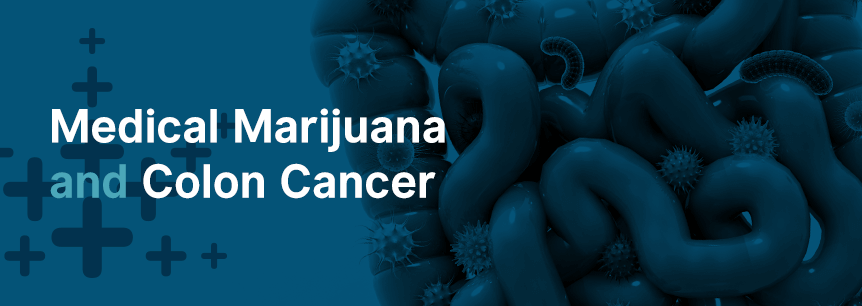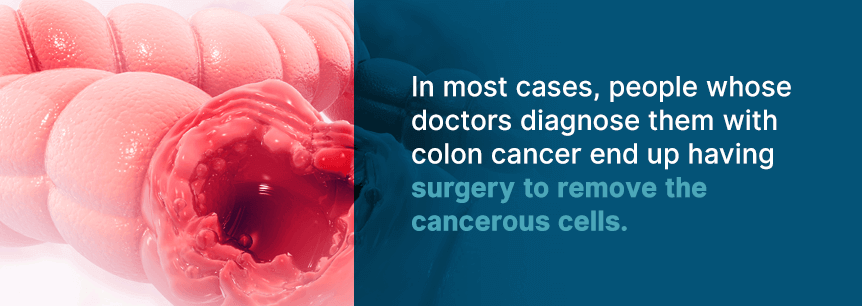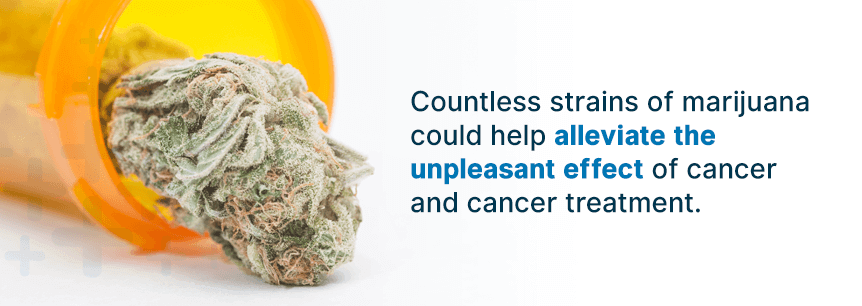
Colon cancer is a severe disease that can cause some uncomfortable symptoms. Medical marijuana can help relieve some of these symptoms. It can also provide tremendous relief from the side effects linked with traditional methods of cancer treatment, such as chemotherapy. If you or someone you know has received a colon cancer diagnosis, keep reading to find out more about this disease and how medical marijuana could help.
Also called the large intestine, the colon is the last part of the digestive tract. As with other parts of the body, cancer can form in the colon. Cancer is a disease that causes cells in the body to multiply uncontrollably. It’s natural for your cells to reproduce to replenish themselves, but cancerous cells are abnormal and divide too rapidly.
In most instances, colon cancer starts with small, benign polyps that form in the colon. Benign means they are not cancerous. However, they can become cancerous over time. Routine screening tests can detect these polyps before they have a chance to turn into cancer.
Colon cancer sometimes falls under the umbrella term colorectal cancer, which includes both colon and rectal cancer. These cancers are closely related, but they are not the same. As the name suggests, rectal cancer forms in the rectum, which is the very last section of the large intestine. Both kinds of colorectal cancer are severe, but in this post, we will focus on colon cancer, specifically.
One of the dangers of colon cancer is that it doesn’t tend to cause noticeable symptoms until it has become more advanced. The size of the tumor or tumors in your intestine, as well as their location, can affect the symptoms you experience.

Common symptoms include:
Here are some vital statistics that can help build a complete picture of the severity of colon cancer today.
Doctors use three primary methods to treat colon cancer: surgery, chemotherapy, and radiation.
If your physician detects colon cancer very early on, early enough that it is stage one or lower, you may not need surgery to have polyps removed. Because these polyps form inside the large intestine, and your large intestine is accessible through your anal orifice, you can undergo a minimally invasive procedure called a polypectomy.
This procedure is the same as a colonoscopy but involves the extra step of polyp removal. It involves inserting a tube, called a colonoscope, into your rectum and up into the colon. A colonoscope has an on-board camera, which allows doctors to see where polyps are. A wire loops around the polyp and removes it while cauterizing the wound to close it off.
Even after cauterization, wounds can still sometimes bleed and become infected. If you already have an infection in your gastrointestinal tract, a polypectomy can cause it to spread. The most dangerous and rare complication is if your bowel becomes perforated. If this happens, you’ll need emergency surgery to close the perforation.
In most cases, people whose doctors diagnose them with colon cancer end up having surgery to remove the cancerous cells. Typically, you can expect to get part of your colon removed, along with the tumor. You may also have specific lymph nodes removed if the cancer has spread.

In some cases, the surgeon will make one long incision on a patient’s abdomen and manually cut and remove tumors and sections of the large intestine, making sure to sew everything back up neatly. This method is known as open surgery. It typically results in a somewhat painful and sometimes drawn-out recovery process. It can also make a person vulnerable to developing an infection.
However, laparoscopic surgery has become an increasingly popular option in recent years. In laparoscopic surgery, a surgeon makes several minor incisions into the abdomen and uses a camera, inserted inside the body, to help them perform the surgery. In some cases, doctors operate robotic arms from a control panel, rather than completing the procedure manually. Laparoscopic surgeries typically result in less pain, a quicker recovery time and fewer complications.
Chemotherapy, often shortened to “chemo,” is a drug regimen patients can use before or after surgery to help fight cancer. Doctors can administer the drugs intravenously or by mouth. The purpose of using drugs before surgery is to shrink the tumors to make them easier to remove. Typically, though, chemotherapy for colon cancer is adjuvant chemotherapy, meaning patients take it after surgery. The purpose of this chemo is to target cancer that has spread beyond the colon to the lymph nodes.
Chemotherapy must be strong enough to kill cancer cells, so it will inevitably damage some good cells, as well. That is why chemo often causes people to lose their hair. Hair loss isn’t the only unfortunate side effect, though. Chemo comes with a whole host of adverse side effects, including:
These only cover some of the side effects you might experience from chemotherapy.
Radiation is a type of treatment people strongly associate with cancer, but doctors use it less often for colon cancer. Like chemo, radiation kills cancer cells. In this case, though, high-energy rays help eliminate cancerous cells that may remain after surgery.
Doctors administer radiation in conjunction with chemotherapy for an especially effective method of killing cancer and preventing it from returning. Unfortunately, radiation involves many of the same side effects of chemotherapy, so combining these two forms of treatment can result in intensified side effects, such as nausea, mouth sores, and many others.
Targeted therapies are drugs cancer patients often take as an additional form of treatment beyond chemotherapy, or as an alternative if chemo hasn’t been successful. These drugs target the source of cancer, the changes in genes and proteins that lead to abnormal cells, to help prevent cancer from spreading or growing. A few examples of these drugs for colon cancer are Panitumumab, Bevacizumab, and Cetuximab.

Side effects depend on the drug, but some of the most common side effects of targeted therapies include:
While the vast majority of people with colon cancer choose to treat it through conventional methods, they may also look to alternative forms of treatment to help their bodies heal and to combat both the symptoms of their cancer and the side effects of conventional treatment methods, such as chemotherapy. That is where medical marijuana comes in. Multiple studies have shown cannabis to have some positive impact of particular interest to those fighting colon cancer.
While clinical trials are investigating the potential benefits of marijuana as a natural means of treating cancer itself, this line of research is still in its formative stages. There have already been some exciting findings suggesting cannabis may have cancer-fighting properties. For example, a 2012 study in the Journal of Molecular Medicine looked at how using phyto- and endocannabinoids to activate the endocannabinoid system — the system cannabis affects — protected the colon from becoming inflamed. The researchers concluded cannabidiol, a constituent of cannabis, has a chemopreventive effect and can slow down the rate of cell proliferation.
This study and others demonstrating the cancer-fighting effects of cannabis could have significant implications for future cancer treatment. However, a great deal more research needs to go into exploring these possibilities before we can be sure marijuana alone is an effective means of fighting cancer.
We do know for sure that marijuana can be an effective means of alleviating the symptoms of cancer and the side effects of conventional cancer treatments. The Colorectal Cancer Alliance confirms this. They point out the common theme across research and literature on the topic of marijuana and colon cancer is how cannabis and cannabinoids can help manage side effects to enhance the benefits of conventional treatments. The two main side effects marijuana alleviates are chemotherapy-induced nausea and pain.
Marijuana can help treat other symptoms, as well. For example, its anti-inflammatory properties help with both pain and abdominal cramping. Weed can also help a fatigued person feel more energized and can be an extremely useful appetite stimulant. These are all essential benefits to colon cancer sufferers.
Finally, it’s also worth noting fighting cancer can cause other issues, like anxiety or depression. While these aren’t immediate symptoms of cancer, they are a reality for many people going through the stress and discomfort of cancer treatment. Here, too, marijuana can help tremendously. It has a well-earned reputation for improving mood and alleviating anxiety.
There are many ways you can administer medical cannabis for colon cancer.

Here are several viable options to consider.
There are also many ways to ingest marijuana, such as consuming edibles or smoothies containing raw cannabis. These methods may be less accessible for people undergoing cancer treatment, however, since they may feel too nauseous or may vomit before the marijuana they consumed has had a chance to take effect.
Marijuana is not without potential side effects, so it’s essential to be aware of those. However, with proper use, marijuana has very few potentially harmful side effects to consider, especially compared to conventional cancer treatments. Even if you find you experience some undesirable side effects from using medical marijuana, you can experiment with another strain your body may react more positively to. In the next section, we will look at some strains to try first that should help alleviate your symptoms.
Here are some of the side effects you could experience from some strains of cannabis:
It’s critical to note marijuana — like any other drug treatment — carries the risk of abuse, and when people misuse it, it could involve more significant side effects. Unlike some other drugs, which could cause serious side effects instantly in those who take them in excess, marijuana’s more severe side effects occur from long-term excessive use. For example, though marijuana can help with digestive issues in the short term, using marijuana excessively over a long period can lead to Cannabinoid Hyperemesis Syndrome, a disorder that causes extreme nausea.
For most people, the most significant long-term side effect to be cautious about is respiratory issues from smoking. Fortunately, as we’ve seen, there are lots of other ways you can administer marijuana without inhaling smoke.
Marijuana’s negative side effects are pretty minimal, and you can find a treatment plan and strain that works well with your body to minimize any unwanted side effects.
Countless strains of marijuana could help alleviate the unpleasant effect of cancer and cancer treatment.

Here are several to try that target some common side effects and symptoms you may be dealing with.
If you or a loved one are receiving treatment for colon cancer, consider using medical marijuana to help relieve adverse symptoms of your cancer and the side effects of treatment. Unlike drugs with many negative side effects and complications, marijuana is a natural remedy that can provide relief from pain, nausea, and fatigue. It can help stimulate your appetite and boost your mood.
If you want to reap the many benefits medical marijuana can provide, start by searching for a medical marijuana doctor or a dispensary near you. All the doctors we steer you to are experienced and licensed to recommend marijuana. One of these doctors in your area can help you determine the best methods and strains to help deliver the results you’re looking for. Medical cannabis has outstanding potential for patients with colon cancer who are looking for natural and effective relief.
Find A Doctor Find A Dispensary